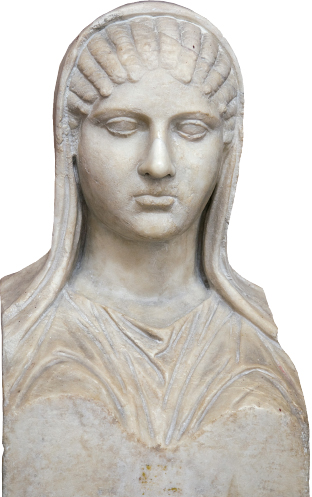Individuals in Society: Aspasia

“If it is necessary for me indeed to speak of female virtues, to those of you who have now become widows, I shall explain the entire situation briefly. It is in your hands whether you will not fall below your nature. The greatest glory to you is to be least talked about by men, either for excellence or blame” (Thucydides 2.46.1). These words were reportedly uttered by Pericles to the widows at a public funeral honoring those killed during the first year of the Peloponnesian War. We have no idea whether Pericles actually said something like this — Thucydides often inserted speeches to make his history more dramatic — but these words express the Athenian ideal of proper behavior for a citizen’s wife: she should stay at home and limit her talents to her household. This ideal became the reality for most Athenian women, whose names and actions were not recorded and thus are lost to history.
One exception to this silence is Aspasia (as-
Aspasia herself was accused by various Athenian authors of causing one or another of Athens’s wars because of personal vendettas or perverse sexual desires. Pericles’s death in 429 B.C.E. in the plague of Athens left Aspasia without a protector, and she disappears from the historical record shortly afterward. Ever more embellished stories about her continued to be told, however. By the time of the Roman biographer Plutarch in the first century C.E., it was said that she held public philosophical discussions, was put on trial for impiety, and became the mistress of another Athenian general after Pericles’s death.
It is almost impossible to separate the historical Aspasia from the imaginary one, but what is clear is that her status was dependent on her personal relationships with prominent men. She may well have been a gifted and intelligent speaker, but her actions were severely limited because of her status as a noncitizen in a place where citizenship was essential and even more because of her status as a woman. Thanks largely to her enemies, we do know her name, but Aspasia lacked the honored social position of the anonymous Athenian citizen women that her lover Pericles may have praised.
QUESTIONS FOR ANALYSIS
- What allowed Aspasia to have a position quite different from that seen as ideal in Pericles’s speech?
- Why might Pericles’s enemies have enhanced accounts about her talents and her influence over him? Can you think of more recent parallels?

ONLINE DOCUMENT PROJECT
What does Aspasia’s story reveal about the expectations and ideals surrounding gender in classical Greek society? Keeping the question above in mind, analyze texts and images that testify to Greek attitudes about gender roles during Aspasia’s time, and then complete a writing assignment based on the evidence and details from this chapter.
See Document Project for Chapter 3.